Gay people ‘treated as second-class citizens’ in Northern Ireland, Sinn Fein leader says
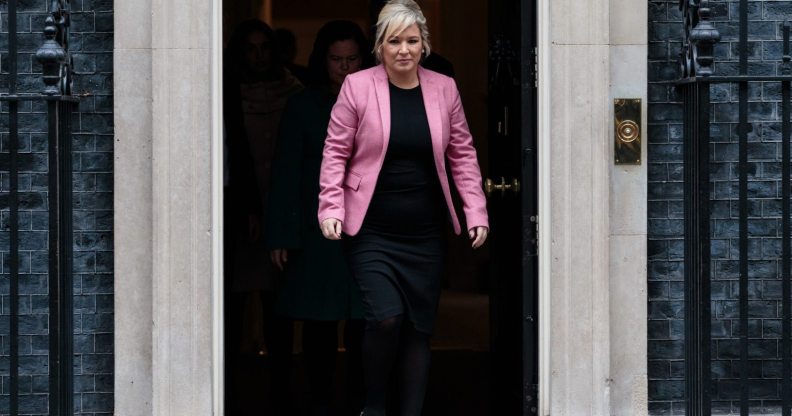
Leader of Sinn Fein in Northern Ireland Michelle O’Neill leaves Number 10 Downing Street (Jack Taylor/Getty)
The leader of Sinn Fein in Northern Ireland has warned that people will no longer tolerate same-sex couples being treated as “second-class citizens”.
Northern Ireland is the only part of the UK that still bans same-sex couples from marrying, as the ultra-conservative Democratic Unionist Party has employed peace process powers to block equal marriage bills in the region.
Further complicating the issue, the region has been without a government since January 2017 due to the failure of power-sharing talks between Sinn Fein and the DUP, who legally must form an executive as the two largest parties.
Sinn Fein has demanded assurances on equal marriage as part of a settlement before power-sharing can resume, but DUP officials insist they will never cave in to the demand.
Michelle O’Neill, Sinn Fein’s leader in Northern Ireland, today warned that gay people could not be treated as “second-class citizens”.
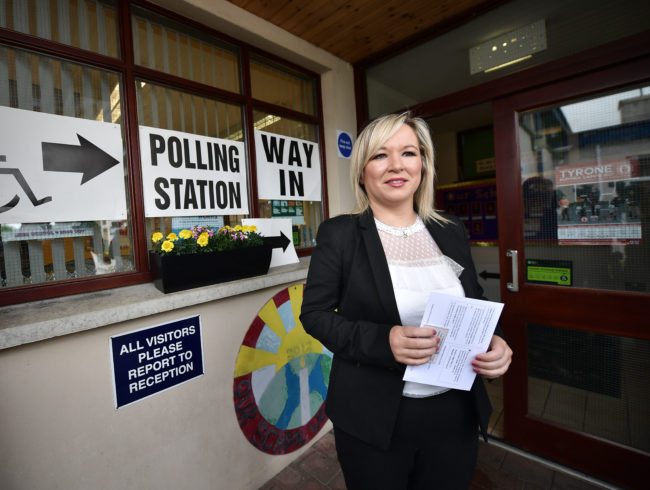
Sinn Fein northern leader Michelle O’Neill (Photo by Charles McQuillan/Getty Images)
In a New Year’s address, she said: “The past 12 months has been an extraordinary time politically.
“We have witnessed incredible political developments, suffered the loss of a political giant but also the reawakening of the demand for fairness and equality at the heart of our political process.
“And as we look forward to 2018, Sinn Féin is determined and optimistic that we will realise that demand.”
She added: “I am optimistic because I see the transformation that has taken place in this society since the people voted for the Good Friday Agreement 20 years ago.
“I see the young people who will not tolerate their peers being treated as second-class citizens because of their sexuality.
“I see civic society standing up to be counted and demanding their rights and entitlements are protected and enshrined on the same basis as they are elsewhere on these islands.
“They will not accept the denial of language rights, of marriage equality and the right to coroner’s inquests because the DUP dictate it.
“People across Ireland have been shaken by the recklessness of the DUP-Tory Brexit agenda and the immense harm it will cause to communities and the economy throughout the island.
“That is not the future they want for their children and grandchildren.”
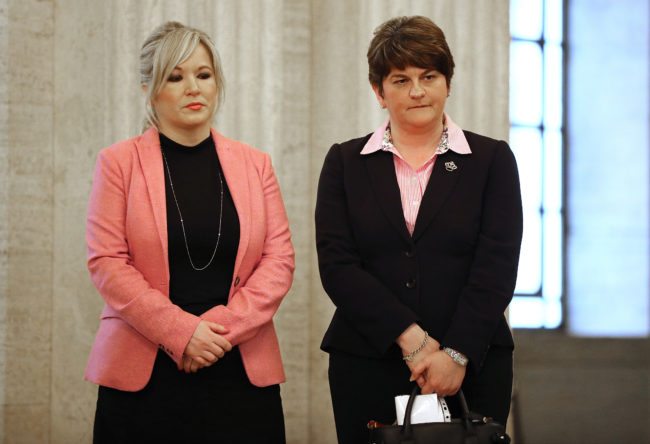
Sinn Fein leader Michelle O’Neill (L) and (DUP) Democratic Union Party Leader Arlene Foster (Photo by Dan Kitwood/Getty Images)
She added: “Fifty years on from the Civil Rights campaign in 1968, the North is a very different place. A place where the denial of rights, equality and respect will no longer be accepted.
“A majority want the restoration of genuine power sharing.
“A majority want rights and equality.
“A majority reject the frustration of their achievement; the erection of a barrier to this by a minority who have a different political opinion or religious belief.”
Of a potential deal to restore power-sharing, she said: “I believe that can happen early in the New Year but only if the institutions represent genuine and equal partnership Government for all our people.
“That will require the British government and the DUP accepting the political and democratic reality which has already been made abundantly clear by the electorate.”
LGBT activists in the region have previously called for the UK government to directly intervene to secure equal marriage due to the collapse of power-sharing.
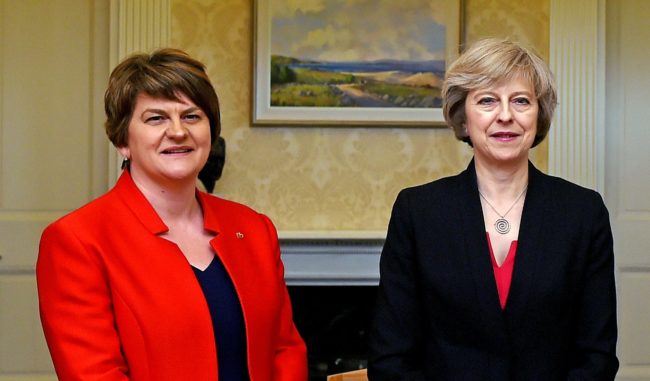
Arlene Foster with British Prime Minister, Theresa May
Director of The Rainbow Project John O’Doherty said: “Of course, we would prefer that the Northern Ireland Assembly were in a position to grant these rights; the Assembly is not currently functioning.
“It is, therefore, the responsibility of Theresa May’s government to make the necessary amendments to the marriage legislation to make it applicable in Northern Ireland.
“The eyes of LGBT people around the world will now be on Theresa May. She says that she has changed her mind on LGBT equality over her years in Parliament. Now is her chance to prove it.”
Clare Moore of Love Equality concurred: “During this period of political instability it is now imperative that the Westminster government takes immediate action to ensure that the rights of LGBT people in United Kingdom are available for all UK citizens.”
Such a move would likely be opposed by both the DUP, who oppose equality, and Sinn Fein, who oppose UK interventions in Northern Ireland.
Explainer: Why doesn’t Northern Ireland have equal marriage yet?
A UK government minister recently ruled out calls to intervene to secure equal marriage via Westminster – insisting it’s “not the time” to interfere.
Tory minister Chloe Smith said: “This is not the time to be unpicking the devolution settlement on this issue.
“This is, rightly, for a future executive to return to look at. We hope the executive can be brought back up to do this, and look at many other very important issues.”
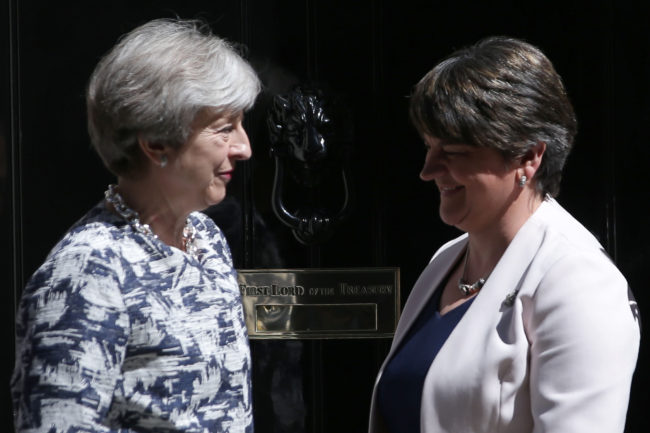
Theresa May and Arlene Foster (Getty)
She added: “My own position on this issue is clear. I voted in support of equal marriage in England and Wales and like the Prime Minister I hope that this can be extended to Northern Ireland in the future.
“I believe that marriage should be a common right across the UK, however, the fundamental position remains that same-sex marriage is a devolved issue in Northern Ireland.”
If the issue is left to a “future executive”, LGBT campaigners fear it may not be on the table for several years.
However, there were hints last month that the UK Labour Party may support proposals to break the impasse.
According to The Times, Jeremy Corbyn’s Shadow Northern Ireland Secretary Owen Smith is in favour putting equal marriage and abortion rights to a referendum if power-sharing is not restored.
Polling suggests that there is overwhelming support for same-sex marriage in the region, and when a referendum was held in the Republican of Ireland in 2015, 62% backed the change.
A referendum could be a way to allow equal marriage in Northern Ireland to go ahead with popular support, despite the lack of power-sharing.

